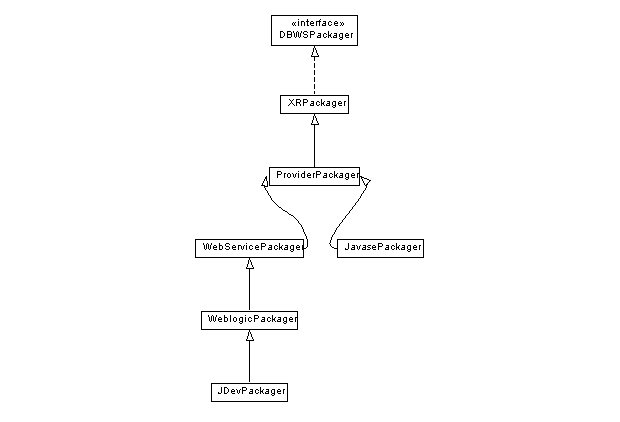Notice: this Wiki will be going read only early in 2024 and edits will no longer be possible. Please see: https://gitlab.eclipse.org/eclipsefdn/helpdesk/-/wikis/Wiki-shutdown-plan for the plan.
EclipseLink/UserGuide/DBWS/DBWSBuilderAPI
DBWSBuilder API
The EclipseLink DBWS design-time utility - DBWSBuilder - is a Java application that generates EclipseLink DBWS files and assembles them into deployable archives.
It is normally invoked from the command-line via its main method:
prompt > dbwsbuilder.cmd -builderFile {path_to_builder.xml} -stageDir {path_to_stageDir} -packageAs {packager}The given builder XML file is parsed:
<?xml version="1.0" encoding="UTF-8"?> <dbws-builder xmlns:xsd="http://www.w3.org/2001/XMLSchema" <properties> <property name="projectName">test</property> <property name="driver">oracle.jdbc.OracleDriver</property> <property name="password">tiger</property> <property name="url">jdbc:oracle:thin:@localhost:1521:ORCL</property> <property name="username">scott</property> </properties> <table catalogPattern="%" schemaPattern="SCOTT" tableNamePattern="EMP" /> </dbws-builder>
by the OXM Project o.e.p.tools.dbws.DBWSBuilderModelProject producing model objects that represent properties and <table> operations. Thus the public class org.eclipse.persistence.tools.dbws.DBWSBuilder can be populated
programmatically through property setters (i.e. setDriver(), setUrl()) - table or procedure operations
can be added via the public addDbTable() and addDbStoredProcedure() methods; SQL operations via addSqlOperation().
The packager specified on the command-line is represented by a class that implements the o.e.p.tools.dbws.DBWSPackager interface. There is a hierarchy of concrete implementations of this interface:

The primary responsibility of a DBWSPackager is to provide java.io.OutputStream's for the output generated by DBWSBuilder:
// call-backs for stream management public OutputStream getSchemaStream() throws FileNotFoundException; public void closeSchemaStream(OutputStream schemaStream); public OutputStream getSessionsStream(String sessionsFileName) throws FileNotFoundException; public void closeSessionsStream(OutputStream sessionsStream); public OutputStream getServiceStream() throws FileNotFoundException; public void closeServiceStream(OutputStream serviceStream); public OutputStream getOrStream() throws FileNotFoundException; public void closeOrStream(OutputStream orStream); public OutputStream getOxStream() throws FileNotFoundException; public void closeOxStream(OutputStream oxStream); public OutputStream getWSDLStream() throws FileNotFoundException; public void closeWSDLStream(OutputStream wsdlStream); public OutputStream getSWARefStream() throws FileNotFoundException; public void closeSWARefStream(OutputStream swarefStream); public OutputStream getWebXmlStream() throws FileNotFoundException; public void closeWebXmlStream(OutputStream webXmlStream); public OutputStream getProviderClassStream() throws FileNotFoundException; public void closeProviderClassStream(OutputStream codeGenProviderStream); public OutputStream getProviderSourceStream() throws FileNotFoundException; public void closeProviderSourceStream(OutputStream sourceProviderStream);
Once all the model objects have been built, the builder is invoked either through the start() method,
or alternatively via the build(...) metho, which overrides the streams from the DBWSPackager,
allowing the user to managed the streams.
public void build(OutputStream dbwsSchemaStream, OutputStream dbwsSessionsStream,
OutputStream dbwsServiceStream, OutputStream dbwsOrStream, OutputStream dbwsOxStream,
OutputStream swarefStream, OutputStream webXmlStream, OutputStream wsdlStream,
OutputStream codeGenProviderStream, OutputStream sourceProviderStream, Logger logger) ...
